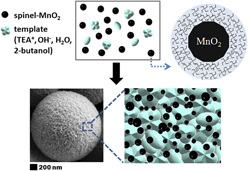Published online by Cambridge University Press: 11 September 2013

We present a simple and quick procedure for the one-pot synthesis of manganese oxides under a basic solvothermal condition in the presence of cationic surfactants acting as the template in a 2-butanol/water solution. Three-dimensional spinel-type MnO2 microspheres composed of small nanoparticles have been fabricated for the first time using our method. Their corresponding electrochemical performances in the applications of supercapacitor electrodes exhibit a good specific capacitance (SC) value of ∼190 F/g at 0.5 A/g and excellent SC retention and Coulombic efficiency of ∼100% and ∼95% after 1000 charge/discharge cycles at 1 A/g, respectively. This suggests its potential applications in energy storage devices. Further, we demonstrate that this solvothermal technique enables the morphological tuning of manganese oxides in various forms such as schists, rods, fibers, and nanoparticles. This work describes a rapid and low-cost technique to fabricate novel architectures of manganese oxides having the desired crystal phase, which will highly benefit various supercapacitor applications.
To send this article to your Kindle, first ensure no-reply@cambridge.org is added to your Approved Personal Document E-mail List under your Personal Document Settings on the Manage Your Content and Devices page of your Amazon account. Then enter the ‘name’ part of your Kindle email address below. Find out more about sending to your Kindle. Find out more about saving to your Kindle.
Note you can select to save to either the @free.kindle.com or @kindle.com variations. ‘@free.kindle.com’ emails are free but can only be saved to your device when it is connected to wi-fi. ‘@kindle.com’ emails can be delivered even when you are not connected to wi-fi, but note that service fees apply.
Find out more about the Kindle Personal Document Service.
To save this article to your Dropbox account, please select one or more formats and confirm that you agree to abide by our usage policies. If this is the first time you used this feature, you will be asked to authorise Cambridge Core to connect with your Dropbox account. Find out more about saving content to Dropbox.
To save this article to your Google Drive account, please select one or more formats and confirm that you agree to abide by our usage policies. If this is the first time you used this feature, you will be asked to authorise Cambridge Core to connect with your Google Drive account. Find out more about saving content to Google Drive.